A common question I am often asked is “what treats can I give to my chickens?” There are of course no end of tasty greens that you can give to your girls that they will enjoy. Even a bucket load of weeds from the garden are a treat as they will scratch their way through them, sifting out the best bits, however if you would like to provide some really tasty treats that will help to tame your chickens to come to you when you want then insects or mealworms are very popular.
Peas are also a firm favourite for my girls, they are cheap and fresh. You can also defrost a handful of peas quickly by dropping them into some hot water for a few minutes.
Update: New Rules on Feeding Mealworms
The problem is that since I originally wrote this page in 2011, DEFRA banned the feeding of mealworms to chickens producing eggs for human consumption (in 2014, also see my page on animal by-product regulations). Many people continue to feed them, maybe because they don’t know about this rule, or maybe they feel they won’t cause any harm.
Hens absolutely love them, so if you do decide to feed them, at least be aware that it is illegal and understand the reasons why.
Mealworms are usually produced abroad and imported into the UK. To produce them, animal protein can be used. Following BSE and foot and mouth disease (which were both caused by feeding animal proteins back to animals, spreading disease) DEFRA decided that products containing animal proteins should not be fed to chickens.
I have noticed that the dried insects that you buy online are usually Gamma Irradiated & ozone sterilised so they are often stated as being pathogen free but I couldn’t tell you if that’s safe or not. Mealworms are not currently inspected / certified as being free of ingesting animal proteins which I believe is why there is a ban.
Whilst on holiday in France, I was curious to see that the rules seem to be different (or companies are not following them?) so for our readers in France, there are mealworms marketed specifically for chickens on the shelves of many pet stores.
Anyway, just so you know, the rest of this page was written before the rules changed.
Insects for Chickens
Small insects can be added to your chickens feed or they can be fed to them by hand.
As you will see when your birds free range around the garden, they will eat any insects that fly or crawl close enough!
Insects provide essential amino acids required for good health. The insects you can buy have been dried so will keep a long time so you can use them from time to time as healthy treats for your birds or to tame them and hens absolutely love them.
They can be scattered around the run to encourage natural foraging. If you are using these with young birds, soak them in water first to make them easier to digest.
Dried Maggots
Dried maggots can be fed as treats for your chickens. They are high in fat and protein and provide lots of essential amino acids for your birds.
As well as being a treat, they are useful to have in stock for birds that are underweight, growing (due to their high protein / fat content) or recovering from illness.
Dried maggots keep for a long time and can be fed mixed with feed, scattered in the run to encourage foraging or soaked before use if feeding younger birds.
Dried Mealworms
Mealworms are the larvae of a beetle which feed on vegetables. Dried mealworms are probably the most popular treat that chicken keepers use to tame their birds.
Mealworms are high in protein, contain vitamins and high grade edible oils.
Mealworms that you can buy dried will (like the other insects) keep a long time and can be scattered around the run to encourage natural foraging.
Again, if you are using these with young birds, remember to soak them in water first to make them easier to digest.
Feather Pecking Boredom Buster
‘Occupational Health’ for chickens! This is another nutritional treat but this time one that can be useful to use as a boredom buster.
Chickens may start feather pecking if they are bored in a run during the day. Feather pecking is a difficult vice to cure but often if you have treats like this peck-a-block hanging in the run and you scatter insects in the morning and a handful of mixed corn per bird (called ‘scratch’ in the US) to encourage foraging, you can often stop feather pecking that occurs through boredom.
The pecking block contains a mixture of insects, grains, seeds and herbal extracts.
It is a complimentary Poultry Feed that provides long lasting stimulation for chickens and again, helps with boredom in the run. They are very reasonable priced at only a few pound so several can be kept in stock and added to the run as required.
Where to Buy Insect Blocks
Amazon have a complete range of reasonably priced insect treats in various sizes that are suitable for chickens available from a number of different sellers. You can see the complete range here on this page.

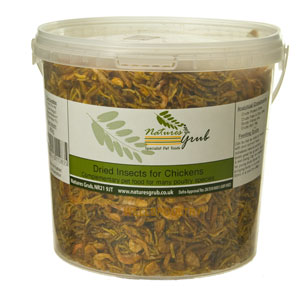
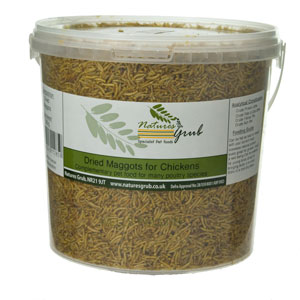
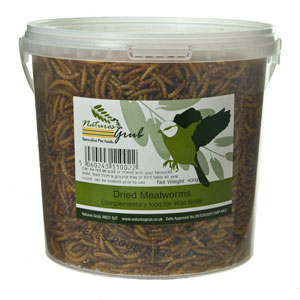
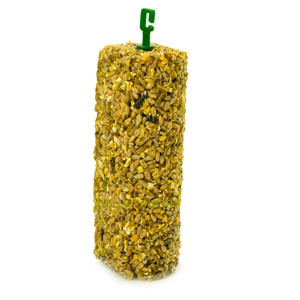
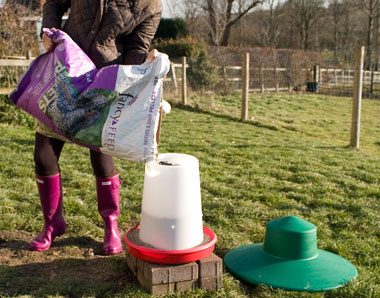
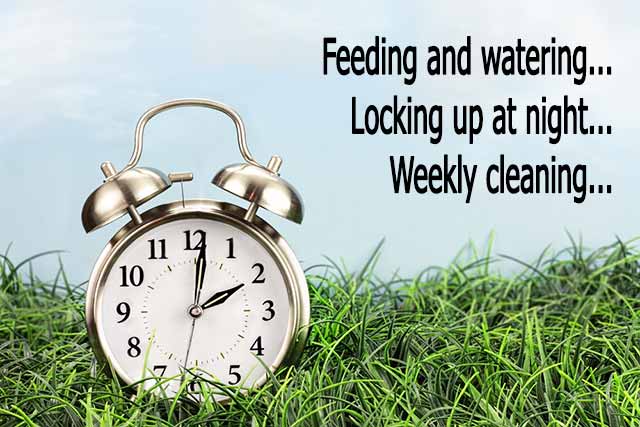
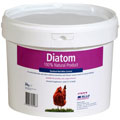
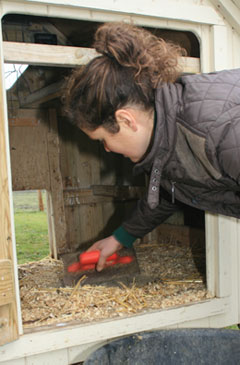

My chicken loves to eat grapes, is this ok to feed them to her?
Yes, I don’t see why not – just don’t overdo it or she’ll get the runs!
I have recently taken over looking after 3 hens from friends who have moved away. I found a soft egg shell in amongst the poo when cleaning the other day and I found this morning “Pearl” just laid the contents of the egg but no shell????? looking at her vent I noticed the very soft shell remains so I gently pulled it out, but it dose no appear to be a complete shell, very deformed, how do I help her get the rest out because I am aware that she can get very sick, and die. They are very free range in my back yard now, but I think they were confined to a run before coming to me, How can I prevent this from happening again. Not sure on the age of the girls
If you wait, it will probably come out naturally. Normally soft eggs are nothing to worry about, they appear from time to time, usually at the beginning or the end of a laying period. Just make sure the hens have oyster shell grit and they should have enough calcium to make strong shells.
Hi I’ve read that you shouldn’t feed chickens dried meal worms and only live ones is this correct ?
Technically in the UK you shouldn’t feed them at all (according to Defra we’re not allowed to feed meat / animal products etc. after the BSE outbreak) but in reality, backyard chickens are often fed meal worms. Personally I would say they are a very low risk of causing problems.
Why wouldn’t dried meal worms be suitable? There is a lot of information on line some is not so good, especially on self professed ‘chicken expert’ blogs, usually from the U.S. If you are unsure, check a site such as poultrykeeper.com you shouldn’t go far wrong there – they update their articles if something isn’t correct and they usually use published authors and vets to write for them.
Any problems with feeding peanuts as a treat
I guess wild birds eat them, I have never tried them on chickens though – they may be a little big if fed whole.
What about slugs and worms it’s the sort of thing that they grab while foraging?
Yes, absolutely!